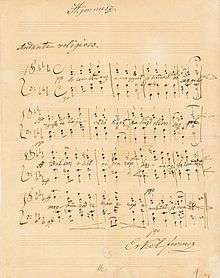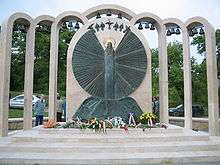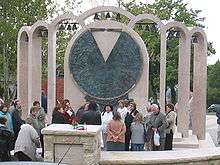Himnusz
| English: Himnusz | |
|---|---|
 Original sheet music for Himnusz. | |
|
National anthem of | |
| Also known as |
Isten, áldd meg a Magyart English: God, bless the Hungarians A magyar nép zivataros századaiból English: From the stormy centuries of the Hungarian people |
| Lyrics | Ferenc Kölcsey, 1823 |
| Music | Ferenc Erkel |
| Adopted | 1844 |
| Audio sample | |
|
Himnusz
| |
"Himnusz" is the official national anthem of Hungary. It was adopted in the 19th century and the first stanza is sung at official ceremonies. The words were written by Ferenc Kölcsey, a nationally renowned poet in 1823, and its currently official musical setting was composed by the romantic composer Ferenc Erkel in 1844, although other less-known musical versions exist. The poem bore the subtitle "A magyar nép zivataros századaiból" ("From the stormy centuries of the Hungarian people"); it is often argued that this subtitle – by emphasising past rather than contemporary national troubles – was added expressly to enable the poem to pass Habsburg censorship. The full meaning of the poem's text is evident only to those well acquainted with Hungarian history.
The lyrics of "Himnusz" are a prayer beginning with the words Isten, áldd meg a magyart (![]() listen ) ("God, bless the Hungarians").
listen ) ("God, bless the Hungarians").
Title
The title in the original manuscript is "Hymnus" - a Latin word meaning "hymn", and one which had no widely used counterpart in the Hungarian language at the time. The phonetic transcription "Himnusz" replaced the original Latin spelling over time, and as the poem gained widespread acceptance as the de facto anthem of Hungary, so too the word "himnusz" took on the meaning "national anthem". It is only in specialist usage that it is used in its original meaning of "hymn" in Hungarian.
History
Although Kölcsey completed the poem on 22 January 1823, it was only published first in 1829 in Károly Kisfaludy's Aurora, without the subtitle, despite it being part of the manuscript. It subsequently appeared in a collection of Kölcsey's works in 1832, this time with the subtitle.[1] A competition for composers to make the poem suitable to be sung by the public was staged in 1844 and won by Erkel's entry. His version was first performed in the National Theatre (where he was conductor) in July 1844, then in front of a larger audience on 10 August 1844, at the inaugural voyage of the steamship Széchenyi. By the end of the 1850s it became customary to sing Himnusz at special occasions either alongside Vörösmarty's Szózat or on its own.[1]
In the early 1900s, various members of the Hungarian Parliament proposed making the status of Himnusz as the national anthem of Hungary within Austria-Hungary official, but their efforts never got enough traction for such a law to be passed.[2] Later, in the 1950s, Rákosi made plans to have the anthem replaced by one more suited to the Communist ideology, but the poet and composer he had in mind for the task, Illyés and Kodály, both refused.[3] It wasn't until 1989 that Erkel's musical adaptation of Himnusz finally gained official recognition as Hungary's national anthem, by being mentioned as such in the Constitution of Hungary.[1][2]
Official uses
The public radio station Kossuth Rádió plays Himnusz at ten minutes past midnight each day at the close of transmissions in the AM band, as do the state TV channels at the end of the day's broadcasts. Himnusz is also traditionally played on Hungarian television at the stroke of midnight on New Year's Eve.
Alternate anthems
"Szózat" (Appeal), which starts with the words Hazádnak rendületlenül légy híve, óh magyar (To your homeland be faithful steadfastly, O Hungarian) enjoys a social status nearly equal to that of "Himnusz", even though only "Himnusz" is mentioned in the Constitution of Hungary. Traditionally, Himnusz is sung at the beginning of ceremonies, and Szózat at the end (although the Himnusz, resembling a Protestant Chorale, is substantially easier to sing than the difficult rhythm of the Szózat, which is often only played from recording).
Recognition is also given to the Rákóczi March, a short wordless piece (composer unknown, but sometimes attributed to János Bihari) which is often used on state military occasions; and the poem Nemzeti dal written by Sándor Petőfi.
Another popular song is the Székely Himnusz (Szekler Anthem), an unofficial national anthem of the Hungarian-speaking Szekler living in Eastern Transylvania, the Székely Land (now part of Romania) and in the rest of the world.
Lyrics
Two English versions are given below; both are free translations of the Hungarian words.
| Hungarian Lyrics | Literal Translation | Poetic Translation |
| Isten, áldd meg a magyart
Jó kedvvel, bőséggel, Nyújts feléje védő kart, Ha küzd ellenséggel; Bal sors akit régen tép, Hozz rá víg esztendőt, Megbűnhődte már e nép A múltat s jövendőt! |
O God, bless the nation of Hungary
With your grace and bounty Extend over it your guarding arm During strife with its enemies Long torn by ill fate Bring upon it a time of relief This nation has suffered for all sins Of the past and of the future! |
O, my God, the Magyar bless
With Thy plenty and good cheer! With Thine aid his just cause press, Where his foes to fight appear. Fate, who for so long did’st frown, Bring him happy times and ways; Atoning sorrow hath weighed down Sins of past and future days. |
| Őseinket felhozád
Kárpát szent bércére, Általad nyert szép hazát Bendegúznak vére. S merre zúgnak habjai Tiszának, Dunának, Árpád hős magzatjai Felvirágozának. |
You brought our ancestors up
Over the Carpathians' holy peaks By You was won a beautiful homeland For Bendeguz's sons And wherever flow the rivers of Árpád our hero's descendants Will root and bloom. |
By Thy help our fathers gained
Kárpát’s proud and sacred height; Here by Thee a home obtained Heirs of Bendegúz, the knight. Where’er Danube’s waters flow And the streams of Tisza swell Árpád’s children, Thou dost know, Flourished and did prosper well. |
| Értünk Kunság mezein
Ért kalászt lengettél, Tokaj szőlővesszein Nektárt csepegtettél. Zászlónk gyakran plántálád Vad török sáncára, S nyögte Mátyás bús hadát Bécsnek büszke vára. |
For us on the plains of the Kuns
You ripened the wheat In the grape fields of Tokaj You dripped sweet nectar Our flag you often planted On the wild Turk's earthworks And under Mátyás' grave army whimpered Vienna's "proud fort." |
For us let the golden grain
Grow upon the fields of Kún, And let nectar’s silver rain Ripen grapes of Tokay soon. Thou our flags hast planted o’er Forts where once wild Turks held sway; Proud Vienna suffered sore From King Mátyás’ dark array. |
| Hajh, de bűneink miatt
Gyúlt harag kebledben, S elsújtád villámidat Dörgő fellegedben, Most rabló mongol nyilát Zúgattad felettünk, Majd töröktől rabigát Vállainkra vettünk. |
Ah, but for our sins
Anger gathered in Your bosom And You struck with Your lightning From Your thundering clouds Now the plundering Mongols' arrows You swarmed over us Then the Turks' slave yoke We took upon our shoulders. |
But, alas! for our misdeed,
Anger rose within Thy breast, And Thy lightnings Thou did’st speed From Thy thundering sky with zest. Now the Mongol arrow flew Over our devoted heads; Or the Turkish yoke we knew, Which a free-born nation dreads. |
| Hányszor zengett ajkain
Ozmán vad népének Vert hadunk csonthalmain Győzedelmi ének! Hányszor támadt tenfiad Szép hazám, kebledre, S lettél magzatod miatt Magzatod hamvvedre! |
How often came from the mouths
Of Osman's barbarian nation Over the corpses of our defeated army A victory song! How often did your own son agress My homeland, upon your breast, And you became because of your own sons Your own sons' funeral urn! |
O, how often has the voice
Sounded of wild Osman’s hordes, When in songs they did rejoice O’er our heroes’ captured swords! Yea, how often rose Thy sons, My fair land, upon Thy sod, And Thou gavest to these sons, Tombs within the breast they trod! |
| Bújt az üldözött, s felé
Kard nyúlt barlangjában, Szerte nézett s nem lelé Honját a hazában, Bércre hág és völgybe száll, Bú s kétség mellette, Vérözön lábainál, S lángtenger fölette. |
The fugitive hid, and towards him
The sword reached into his cave Looking everywhere he could not find His home in his homeland Climbs the mountain, descends the valley Sadness and despair his companions Sea of blood beneath his feet Ocean of flame above. |
Though in caves pursued he lie,
Even then he fears attacks. Coming forth the land to spy, Even a home he finds he lacks. Mountain, vale – go where he would, Grief and sorrow all the same – Underneath a sea of blood, While above a sea of flame. |
| Vár állott, most kőhalom,
Kedv s öröm röpkedtek, Halálhörgés, siralom Zajlik már helyettek. S ah, szabadság nem virúl A holtnak véréből, Kínzó rabság könnye hull Árvánk hő szeméből! |
Castle stood, now a heap of stones
Happiness and joy fluttered, Groans of death, weeping Now sound in their place. And Ah! Freedom does not bloom From the blood of the dead, Torturous slavery's tears fall From the burning eyes of the orphans! |
‘Neath the fort, a ruin now,
Joy and pleasure erst were found, Only groans and sighs, I trow, In its limits now abound. But no freedom’s flowers return From the spilt blood of the dead, And the tears of slavery burn, Which the eyes of orphans shed. |
| Szánd meg Isten a magyart
Kit vészek hányának, Nyújts feléje védő kart Tengerén kínjának. Bal sors akit régen tép, Hozz rá víg esztendőt, Megbűnhődte már e nép A múltat s jövendőt! Written by: FERENC KÖLCSEY (1823) |
Pity, O Lord, the Hungarians
Who are tossed by waves of danger Extend over it your guarding arm On the sea of its misery Long torn by ill fate Bring upon it a time of relief They who have suffered for all sins Of the past and of the future! Translated by: LASZLO KOROSSY (2003)[4] |
Pity, God, the Magyar, then,
Long by waves of danger tossed; Help him by Thy strong hand when He on grief’s sea may be lost. Fate, who for so long did’st frown, Bring him happy times and ways; Atoning sorrow hath weighed down All the sins of all his days. Translated by: WILLIAM N. LOEW (1881) |
Himnusz sculpture


On May 7, 2006, a sculpture was inaugurated for Himnusz at Szarvas Square, Budakeszi, a small town close to Budapest. It was created by Mária V. Majzik, an artist with the Hungarian Heritage Award, depicting the full text of the poem in a circle, centered around a two metres high bronze figure of God, with 21 bronze bells in seven arches between eight pieces of stone, each four and a half metres high. The musical form of the poem can be played on the bells. The cost of its construction, 40 million forints (roughly 200,000 USD), was collected through public subscription.
References
- 1 2 3 "A Himnusz története" [History of Himnusz] (in Hungarian). Retrieved 2016-05-17.
- 1 2 "A Himnusz ügye az Országgyűlés előtt" [The matter of the anthem before Parliament] (in Hungarian). Retrieved 2016-05-17.
- ↑ "Betiltották a Himnuszt" [Himnusz banned] (in Hungarian). Retrieved 2016-05-17.
External links
| Look up himnusz in Wiktionary, the free dictionary. |
- Hungarian anthem (video subtitled in 33 languages)
- Hungary: Himnusz - Audio of the national anthem of Hungary, with information and lyrics
- National and historical symbols of Hungary has a page about the anthem, featuring a vocal sound file.
- Sheet Music is available at the Hungarian Electronic Library website.
- Hungarian Anthem on Music Keyboard 2.4
